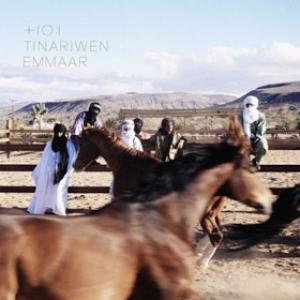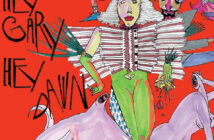With a move from recording in the Sahara to the desert of California, at the Joshua Tree thanks to the political strife in Mali, Toureg ensemble Tinariwen offer up their 6th album distributed in the west. They are the quintessential sound of the desert blues, the most immediately recognisable and compelling of Mali’ electric blues bands. So it’s interesting that they’ve headed to the home of the US equivalent, or that is equivalent if you believe that in Mali the sound would evolve from a mix of Hendrix and traditional sounds, but in the US it would evolve from metal. Joshua Tree is the home of stoner rock, a place of generator parties out in the desert, a place where Kyuss learnt to jam and birthed genre-defining albums like Blues For The Red Sun.
But Tinariwen wont touch this, they are always going to sound like Tinariwen, regardless of their location. They may be in a foreign land but all you need to hear is their incredible guitars to know where you are. Their sound is life affirming, conjuring up wide expanses, music that is intrinsically bound to a place, intrinsically bound to a struggle, intrinsically bound to Mali.
Over this and their previous album the remarkable Tassili, Tinariwen have begun to collaborate with Western artists, but very much on their own terms. Whilst there have been some sceptics of this new direction, more than offering just a few new textures, or making concessions to western audiences, it’s also pushed the band in new directions as they unconsciously adapt to the new sounds. There is something about this approach that keeps the band vital.
This time around they’re joined by Matt Sweeney (Chavez), the Red Hot Chili Peppers’ Josh Klinghoffer, both of whom stand alongside the four guitarists in the band, creating subtle points of difference, poet Saul Williams, and Nashville fiddle/ and pedal steel player Fats Kaplan who’ fiddle work on Imidiwan Ahi Tifhamam seems like the most natural fit in the world. These kinds of cross cultural exchanges are endlessly fascinating and demonstrate not just the ability of music to adapt and evolve but Tinariwen’ desire to continue to progress their sound. Tinariwen of course don’ need outsiders and its demonstrated ably across Emmaar but there is something special about Tinariwen bringing their sounds not just to Western ears, but Western musicians too.
Tinariwen are of course preoccupied by the troubles of their homeland. “The ideals of the people have been sold cheap my friends/a peace imposed by force is bound to fail/ and gives way to hatred,†offers AG Leche on Toumast Tincha betraying a pessimism about the future stability of Northern Mali. In an industry where rebellion is seen as a badge of credibility, the Toureg’ have had more than their fair share of hardship, discrimination and displacement. Suffering is of course the foundation of the blues, yet whilst the turmoil continues to provide inspiration for Tinariwen and their compatriots with everyone from Bassekou Koyoute, Samba Toure, Tamikrest and Vieux Farka Toure producing some of the most vital, defiant and affirming music of the careers, at some point they just want to go home.
Tinariwen appear incapable of making bad music. Their sounds are incredible and their evolution continues to be fascinating.




